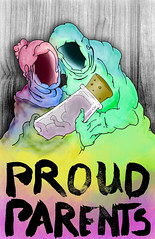 A dear friend and I had a discussion today about the Catholic Church's position on reproductive techonolgy. She had read this article and was surprised to hear that the church would be against adoption. Of course, the church isn't against adoption of children but is against embryo adoption. I understand why but still have some questions.
A dear friend and I had a discussion today about the Catholic Church's position on reproductive techonolgy. She had read this article and was surprised to hear that the church would be against adoption. Of course, the church isn't against adoption of children but is against embryo adoption. I understand why but still have some questions.First, IVF itself. My friend was curious as to why the church, which places such a high value on human life, would be against technology to allow a couple to have children. When a couple loves each other, and wants to share that love with a child, and we have the capability to give them one, why would we not want to do that? This is a child that would be loved and cherished, and clearly the couple has the financial means to give it a good life (or they couldn't afford IVF in the first place).
Very good questions. Let's consider what IVF is. Wikipedia says:
In vitro fertilisation (IVF) is a process by which egg cells are fertilised by sperm outside the womb, in vitro. IVF is a major treatment in infertility when other methods of assisted reproductive technology have failed. The process involves hormonally controlling the ovulatory process, removing ova (eggs) from the woman's ovaries and letting sperm fertilise them in a fluid medium. The fertilised egg (zygote) is then transferred to the patient's uterus with the intent to establish a successful pregnancy.
Aside from the issues surrounding the morality of removing eggs and sperm, and bypassing the relationship and act of love between man and wife, it sounds OK until you get into the method. Eggs are removed from the woman, sperm from the man, and the eggs are fertilized in a petri dish or some other medium outside the body. About 10 to 30 eggs are removed and fertilized at a time. After two to five days, the embryos are "selected" and several are implanted into the woman's uterus.
The selection process is one were the embryologist choose which children will live or die based on criteria. Can you say eugenics? If you can select a child based on these criteria, why not add criteria such as eye color, sex, etc.? We're looking at the precursor to Gattaca.
Then there's the pregnancy rate of 35% and live birth rate of 27%. Of course, there is a high risk of multiple births, so we will want to further cull the embryos by aborting all but one. We've killed enough of our own children already, so what's one more?
Of course, the alternative to this procedure for infertile couple is adopting an already born child. That procedure is extremely risky and has moral questions, like...oh wait! There isn't any risk or any moral dilemma associated with live adoption.
So, rather than thinking of a couple who wants to share their beautiful love, the image in reality is a couple who is so vain that they would ignore the option of sharing their love with a child who needs them, create 10-30 children of their own, kill most of their own children, and risk the lives of the ones they don't intentionally kill, in order to have a "perfect" baby (where "perfect" means having their genetic characteristics). We're not talking about an act of love, but an act of supreme selfishness.
As for being "wanted", whether or not we "want" or even like a person does not affect their basic human dignity and rights.
Back to adoption of embryos. As mentioned, IVF creates 10-30 embryos. The ones which are not used may be destroyed outright or may be frozen and stored. After all, if the couple wants to have another child, it will be cheaper to use a frozen one than to start the process all over again. If the couple doesn't want another child, we can use these for medical experiments. Who cares about them?
Well, some people do, and want to do something about it. But what? One possibility is to "adopt" an embryo. Have it implanted in a woman and grow until birth. It is this "embryo adoption" that the Church teaches us is immoral. Again, one can ask "why?" Here is the case of a technology to allow a couple to have children. When a couple loves each other, and wants to share that love with a child, and we have the capability to give them one, why would we not want to do that? This is a child that would be loved and cherished.
First of all, we have some of the same arguments as before. We would have an embryologist "selecting" which embryo to implant, and we would be putting those children "in harm's way" given the expected number of them that would die. But of course you could make the argument that they are already at risk, when they might be used for medical research or destroyed.
My understanding is that the Church's position is that taking an embryo that is not your own and implanting it in your womb is a form of adultery. Yet, adopting that same child after it has been born is not. At first glance that sounds a little too much like making a distinction between a person who is born and one who is not. However, it is not the state of the embryo that makes the difference, but the intimacy with the mother's body that makes it adultery.
Since it is not valid to perform an evil act even if we intend a good outcome (the end never justifies the means), this means that a couple can't adopt an embryo as it would constitute an evil act (adultery) even if the intended outcome was good (the preservation of the life of the embryo). However, there are certain cases where an unintended evil must be accepted - in the case of ectopic pregnancy, for example.
Could one not make the argument that the implantation of the embryo would be an unfortunate but acceptable evil in order to try to save the life of the embryo? I would argue not, since the implantation could not be done without intention. Thus it doesn't meet the criteria outlined in the ectopic pregnancy case. Hence the Church's term "moral dilemma" in the article.
I'm still not sure I understand this issue entirely. If you have more information or opinion on the subject please let me know.

 I was a Cub Scout. I made it all the way through Webelos. In fact, my dad was my den leader in Webelos. Yet I never went into Boy Scouts. I'm still not sure why. Through the years that part of my life has become misty until I don't really recall much except certain events, good and bad.
I was a Cub Scout. I made it all the way through Webelos. In fact, my dad was my den leader in Webelos. Yet I never went into Boy Scouts. I'm still not sure why. Through the years that part of my life has become misty until I don't really recall much except certain events, good and bad.








